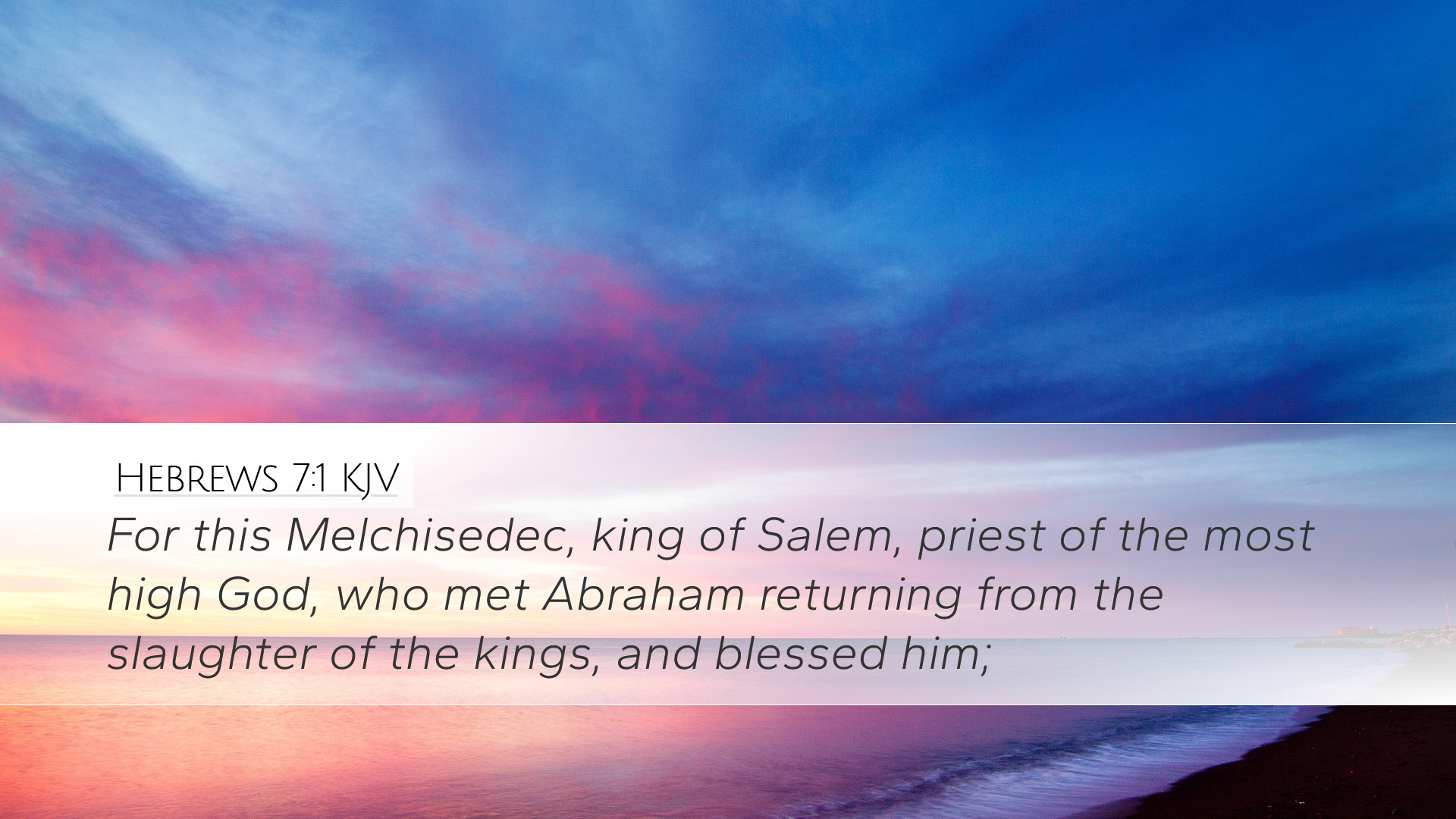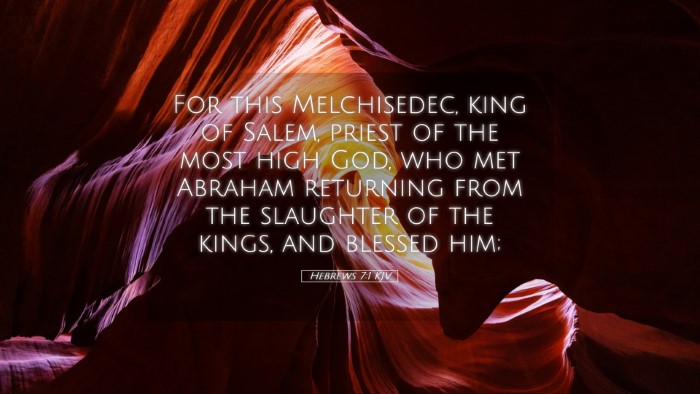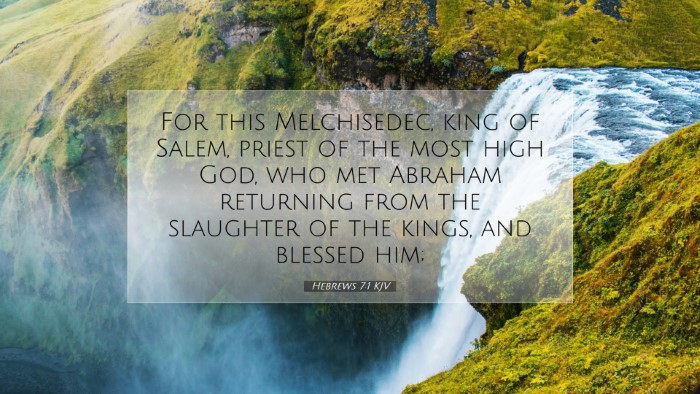Commentary on Hebrews 7:1
Verse: "For this Melchisedec, king of Salem, priest of the most high God, who met Abraham returning from the slaughter of the kings, and blessed him."
Introduction to Hebrews 7:1
The author of Hebrews introduces Melchisedec in this verse as a pivotal figure in the theology of the priesthood, drawing comparisons that highlight the superiority of Christ’s priesthood. This verse sets the stage for an in-depth exploration of the nature of the priesthood and how Melchisedec foreshadows the ultimate role of Jesus Christ as the high priest.
Contextual Background
Understanding the context of Hebrews is crucial for interpreting this verse. The epistle is addressed to Jewish Christians facing the temptation to revert to Judaism due to external pressures and an underestimation of the new covenant. The author argues for the supremacy of Christ and the new covenant, and this leads into the discussion of Melchisedec, highlighting the transition from the Levitical priesthood to that which is eternal and perfect.
The Significance of Melchisedec
Melchisedec’s introduction includes several important details:
- King of Salem: Salem, considered to be Jerusalem, signifies peace, and Melchisedec is presented as a king who embodies this peace.
- Priest of the Most High God: This title signifies a divine legitimacy and authority, marking him as a priest who serves the true God, separate from the Levitical priesthood.
- Meeting with Abraham: The encounter between Melchisedec and Abraham defines Melchisedec’s importance, as he blesses Abraham, highlighting the recognition of his authority.
Theological Insights
The theological implications of Melchisedec's identity are manifold:
- Type of Christ: Melchisedec serves as a type of Christ, embodying characteristics that prefigure Jesus' eternal priesthood. Both are leaders who serve as mediators between God and humanity.
- Nature of the Priesthood: The priesthood of Melchisedec is presented as superior to that of Aaron, as it is not based on genealogical succession. This introduces the concept of a priesthood based on the eternal and unchanging nature of Christ.
- Blessing and Authority: The act of blessing that Melchisedec bestows upon Abraham signifies the profound authority that he holds. This further lays the groundwork for understanding Christ's role in blessing humanity.
Commentary Excerpts
The following commentary insights draw from established public domain sources:
Matthew Henry's Commentary
Matthew Henry emphasizes that Melchisedec's dual role as king and priest illustrates the necessity of a mediator who can effectively relate to both God and man. He points out that Melchisedec’s priesthood is not derived from lineage, suggesting that Jesus, in the order of Melchisedec, fulfills a greater role."He is both king and priest because he rules as king over men and speaks to God on their behalf as a priest, thus bringing the divine into human affairs."
Albert Barnes' Commentary
Albert Barnes elaborates on the significance of Melchisedec being called by God to the priesthood. He observes that the text indicates Melchisedec received tithes from Abraham, which establishes his authority in the priestly order. Barnes asserts that this encounter symbolizes a transfer of blessings and establishes a divine precedent for the priestly ministry: "The high priesthood of Jesus, akin to Melchisedec, is one marked not by succession or genealogy, but by divine appointment and eternal prevalence."
Adam Clarke's Commentary
Adam Clarke delves into the historical and prophetic significance of Melchisedec stating, "His enigmatic appearance and immediate departure from the Biblical narrative signifies a divine purpose; he represents an eternal priesthood that transcends time and tradition." Clarke posits that Melchisedec's blessings upon Abraham depict the overarching narrative of grace that culminates in the blessing of all nations through Christ."
Application for Today
This examination of Hebrews 7:1 encourages pastors, students, and theologians to appreciate the nuanced aspects of Christ's priesthood. The figure of Melchisedec serves as a reminder of the eternal nature of Christ's intercession and the blessings that flow from this divine relationship.
Key Applications:
- Recognition of the Superior Priesthood: Believers are called to recognize the unparalleled nature of Christ's intercession and the assurance it brings in approaching God.
- Understanding Spiritual Leadership: The dual role of king and priest in the life of Christ serves as a model for godly leadership in the church today.
- Encouragement through Blessing: The blessings that flow from Christ as our priest encourage believers to live out their faith actively, serving as conduits of God's grace to others.
Conclusion
Hebrews 7:1 introduces Melchisedec not just as a historical figure but as a theological anchor point that reveals the richness of Christ's identity and work among us. As we contemplate the implications of this passage, we are reminded of the eternal nature of Christ’s priesthood, which surpasses all human understanding and offers a profound depth of relationship with the Most High God.


